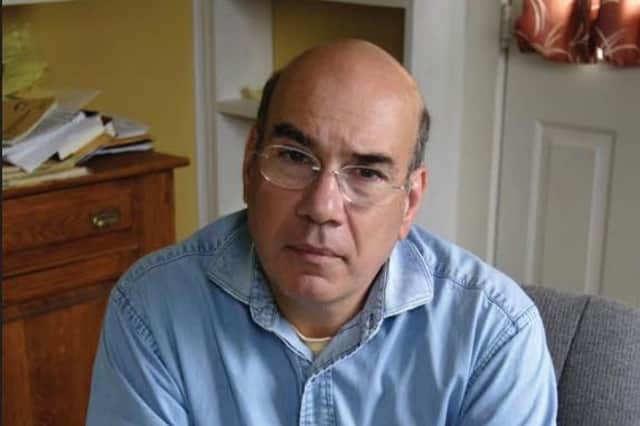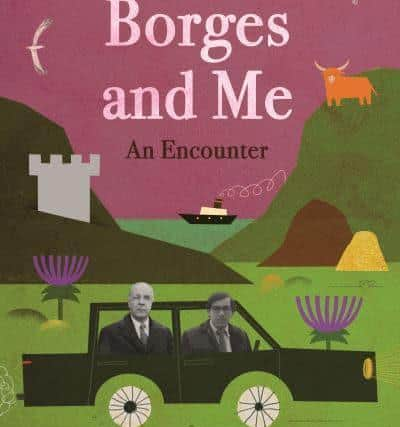Book review: Borges And Me: An Encounter, by Jay Parini


It would be reasonable to question what kind of book this is. The subtitle is “An Encounter,” but other clues are there and thereabouts. The epigraph is from Oscar Wilde – “One’s real life is often the life that one does not lead.” That element of uncertainty is compounded by both the dust-jacket and the afterword. It is “autofiction” or “a kind of novelised memoir.” Now, Jay Parini is a formidable scholar who has written biographies of Robert Frost, John Steinbeck and Theodore Roethke, as well as a novel based on Herman Melville; as well as poetry and theology. But I fear that this book may stretch his caprice too far, even if the other person in the title was an eminently ambiguous fabulist.
I have a personal recollection, not of Jorge Luis Borges, but of Parini telling a story about his meeting with Borges, at the StAnza Festival at the beginning of this millennium. A quick search online reveals that some of the material here appeared as early as 2002 in The New York Times, and other fragments have been in various journals. The book itself attempts to be a quirky Withnail and I of postmodernism, with ever shifting sands, but ends up being a tatterdemalion of stories that seem to have been retold thrice too often.
Advertisement
Hide AdThe bare (and verifiable) bones: Parini went as a doctoral student to St Andrews, where he met the polymath Alasdair Reid, who introduced him to the astonishing Argentinian author of philosophical and mystical “fictions” Jorge Luis Borges. A series of unfortunate events means that Reid is off elsewhere and Parini is left as the minder of the blind, old Borges on a road trip around Scotland. It begins in St Andrews so it as well that Parini tees up his strategies early. “Billy Giordano (as I will call him here)”, “Bella Law (as I will call her)” – both admitted as being amalgams at the end – or “was this a true story? It seemed somehow unimaginable, a fantasy of some kind”. So the skelf has punctured the skin. Is any of this to be taken at its word?


There is the old adage that if something seems too good to be true, it can’t be true. But Borges always dealt with the slippery meniscus between truth and fiction, between recollection and reimagination. Somehow Parini breaks the reader’s trust in these pieces of anecdotage. Did Parini and Borges get lost in a maze in Scone? Don’t know, but the maze is very Borgesian. Did Parini save the life of Borges when he stood up in a rowing boat on Loch Ness declaiming lines of Beowulf and hoping to at least feel the presence of the monster? Dunno. Did Borges hallucinate ghosts on the field of Culloden? Dunno. Does any of this matter to reading Borges. No. The book is remarkably light in terms of reading Borges. There is a smattering of admiration about a few key texts, but little sustained engagement. Some of the conversations have the whiff of “truthiness” about them. Others are mere gossip. An old man having to relieve himself against the suspiciously specific tyre of the clapped out car? Maybe.
Parini confesses that he had never heard of Borges before Reid brought him up. I find this odd. Alright, it was the 70s; but in the 80s, when I was going to university, I’d read Borges as a schoolboy. There is a line which is like a piece of bad conscience. Parini’s tutor, a conservative caricature, advises against doing his thesis on George Mackay Brown, with the words “he is not a well known writer, and he seems to be still alive.” Brown appears in this triptych of dead writers, and of course the dead can not be libelled. So make up what you want and make of it what you will, but I would recommend reading Borges.
Were Borges still alive, there is a book that I have a hunch he would adore: Dennis Duncan’s “Index, A History Of The”. Its title encapsulates its self-referential wit – in its own index, the book “Index, A History Of The” is cited for pages i – 340, with two references to two different indexes. (Not indices). I learned a huge amount from this wry, clever, diverting book, which encapsulates literary criticism, bibliography, the ways in which the Church and the Universities invented the technology of indexing and much more. It also shows how contemporary concerns about digital systems echo back to the same thought patterns of the Middle Ages. Duncan is exceptionally good on the invisible nature of books – we don’t “read” page numbers, for example, and the indexer Paula Clarke Bain has conspired with him for a really good joke about running heads. Duncan says we don’t read an index, we use it, and then disproves himself with the guiding hand of Bain.
It is a book about libraries, how we read, the nature of the alphabet, whether Google is a danger and much more. I learned a great deal from it. From Parini, I basically learned that Borges liked bacon and farted in bed.
Borges And Me: An Encounter, by Jay Parini, Canongate, £14.99
A message from the Editor
Advertisement
Hide AdThank you for reading this article. We're more reliant on your support than ever as the shift in consumer habits brought about by coronavirus impacts our advertisers.
If you haven't already, please consider supporting our trusted, fact-checked journalism by taking out a digital subscription at https://www.scotsman.com/subscriptions